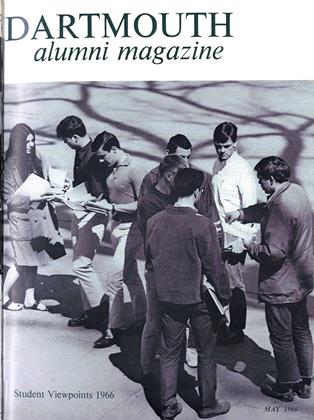By Prof. Jeffrey Hart '51 (English). New York: Doubleday and Co., Inc., 1966262 pp. $4.95.
Some ten years ago Arthur M. Schlesinger Jr., described the recrudescence of conservative political thought in America as "essentially the politics of nostalgia. . . the wrong doctrine in the wrong country in the wrong century directed against the wrong enemies." If 1964 indeed seemed to confirm the weakness of Senator Barry Goldwater's particular brand of conservatism in the realm of practical politics, Professor Jeffrey Hart's excellent study of the contribution made over the last decade by conservative intellectuals in the realm of American political theory belies Schlesinger's cavalier judgment.
For if one familiarizes himself with the literature of the "new conservatism," he will find that the movement has hardly turned out to be, as its critics sometimes claim, either a simplistic glorification of pure laissez faire economics or an irrelevant longing for the even more distant womb of feudalism. The hallmark has instead been an attempt by men like James Burnham, Russell Kirk, Willmoore Kendall, and William Buckley (whose National Review has been an important forum of the movement) to reshape creatively for America's contemporary needs the classic conservative ideas of Western political thought. In doing this they have drawn quite heavily on the early Federalist creed and the Burkean Churchillian tradition of European conservatism. Although their effort has seemed perhaps somewhat less successful to this reviewer than to Professor Hart, it surely added an intellectually interesting and significant point of view to our continuing dialogue over the meaning of a free society and America's role in the world around us And it has done that at a time when events have disillusioned more than a few of us regardless of political persuasion, with many classic liberal assumptions about the innate goodness and rationality of man, his capacity for infinite progress, and the choice of the state as the magic instrument of progress.
With neo-Wilsonian dreams of peace through the political branches of the U.N badly betrayed, it is certainly relevant, for example, to explore the possibility of a more pragmatic approach through an emphasis on the U.N.'s non-political, functional agencies. With some civil rights groups virtually absolutizing the single ideal of equality, it is hardly fair to dismiss out of hand those who neither reject nor absolutize that ideal, but who insist that the realization of equality must involve an accommodation with other values which Americans also cherish, including the right of free association and the preservation of some distinction between the public and private realms of society.
Finally, although the very title of Professor Hart's book identifies the new conservatism as a "dissent" from the contemporary liberal mainstream of America, he and those about whom he writes are refreshingly sensitive to the limits of dissent - particularly in contrast with the "new left's" seeming rejection in toto of American society. As the author himself observes, even John Stuart Mill's liberal apotheosis of "free discussion" presupposed some "prior agreement on fundamentals among those particiating in discussion." For without at least some shared assumptions and goals, discussion becomes meaningless.
This is not to say that these concerns belong only to the self-declared new right. But it is to say that in the last decade the intellectual conservatives, including Jeffrey Hart himself, have articulated these concerns with an eloquent cogency conspicuously absent in earlier Hoover-Taft conservatism and in much liberal thought. That itself and the recent emergence of the new left indeed seem a rather convincing answer to those who claim that the new conservatism has occurred in the wrong century and in the wrong country. In turn, with the prospect that left-right dialectics are now to become even more lively than in the past, Professor Hart's book could not be more timely or more deserving of wide and careful reading.
Associate Professor of Government
 View Full Issue
View Full Issue
More From This Issue
-
 Feature
FeatureStudent Activism at Dartmouth
May 1966 By RICHARD A. BATHRICK '66 -
 Feature
FeatureThe Rewards Eventually Come in the Upperclass Years
May 1966 By NELSON N. LICHTENSTEIN '66 -
 Feature
FeatureANGLOPHILIA HITS THE CAMPUS
May 1966 By ARTHUR N. HAUPT '67 -
 Feature
FeatureUNDERGRADUATE PORTFOLIO 1966
May 1966 By TEXT BY LARRY GEIGER '66 -
 Article
ArticleWith the Big Green Teams
May 1966 -
 Article
ArticleThe Undergraduate Chair
May 1966 By LARRY GEIGER '66
VINCENT E. STARZINGER
Books
-
 Books
BooksNINE SATURDAYS MAKE A YEAR.
OCTOBER 1962 By Cliff Jordan ’45 -
 Books
BooksLOVE MATCH AND ARRANGED MARRIAGE, A TOKYO-DETROIT COMPARISON.
NOVEMBER 1967 By FRANCIS E. MERRILL '26 -
 Books
BooksWARSHIPS OF THE WORLD
October 1944 By Herbert F. West '22 -
 Books
BooksSpokesmen
November 1979 By James A. Epperson -
 Books
BooksMUSIC AND THE MUSICIAN IN JEANCHRISTOPHE, THE HARMONY OF CONTRASTS.
MAY 1969 By LUCIEN DEAN PEARSON -
 Books
BooksTHE TEACHING OF ENGLISH: AVOWALS AND VENTURES
JUNE, 1928 By Stearns Morse



